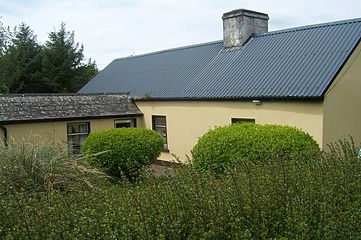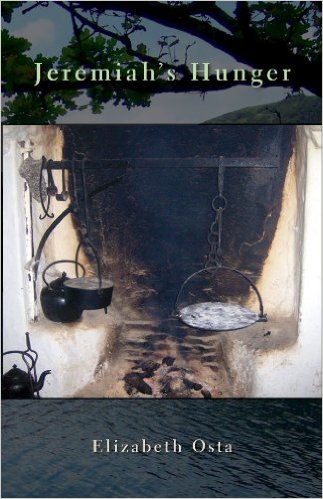Jeremiah's Hunger
At the height of the Irish famine of the 1840s, in a small town of Ahadallane, north of Cork City and south of Mallow, Jeremiah joins the rebels in the fight for Ireland's freedom from British rule and learns firsthand the futility of violence. He and his best friend and brother-in-law, Father Michael Riordan disagree about the means to the end and ultimately take diverse paths when Michael is assigned to a parish in America. Jeremiah's journey brings him into the bare heart of his homeland where he endures the evils borne of domination. His hunger isn't satisfied until he almost loses himself in his quest.
Backstory
 My Grandmother's home
My Grandmother's home
Jeremiah's Hunger began in 1994 when I traveled to Ireland for the third time. This time I carried with me a worn photograph and five carefully preserved letters from the early twentieth century. This time, rather than tour the West Coast with friends and relatives, I went alone. And this time, I found my grandmother's home hidden in the hills of Adadallane.
Father Michael Twohig, pastor of St. Joseph's Church in Fornaught, Donoghmore accommodated my request for church records for the Buckleys. As he thumbed through the yellowed pages of the great red leather bound volume of births, deaths and marriages, he held a page and ran his manicured finger down the right hand side of it. "Here 'tis," he said, looking up at me, his round pink face and clear blue eyes, so emblematic of the land. "A Jeremiah Buckley married a Margaret Riordan on February 1, 1859. Might that be who yer looking for?"
It was indeed. From that day to this, I have visited, read, researched, talked with townspeople and listened to stories about people from this locale. I have written about what I have learned. Jeremiah's Hunger is the result.
Excerpts
Excerpt One...
Jeremiah looked about at the assorted men gathered round the orange-red glow of the embers, their young faces reflecting a mixture of fear and adventure as did their songs. Love songs, ballads and songs of rebellion were mixed with stories of faeries and kings. The evening ended with a rendition of Slievenamon ─ Woman of the Mountain ─ written by Charles J. Kickham, a trusted Young Irelander.
By night, and by day, I ever, ever pray;
While lonely my life flows on
To see our flag unfurled and my true-love to enfold;
In the Valley near Slievenamon.
The melody wafted through the smoky mist with a somberness accompanying it. Then Smith O'Brien called the evening to an end, reminding them to rest up for what was to come. The ominous mood chilled Jeremiah.
Excerpt Two...
Jeremiah stood motionless, fearful of what was happening. She didn't look wild. He couldn't tell what it was he saw or heard. He moved hesitantly, never losing her gaze. She spoke again as he put his cap on the hook. "That's right, go ahead, as if I haven't just told ye our world has come crashing down, torn now to smithereens. Just act as if ye didn't hear me say it, our baby is gone. She's gone."
He stood transfixed. After a moment, he gingerly reached out a hand, afraid he might startle her. She slowly moved in his direction and finally reached out to him. As he enfolded her, she whimpered and mumbled words he could barely make out. "…not here. I looked everywhere. She's gone, gone to God."
He held her for a good several minutes and then led her to the table, where she sat watching him as he warmed their supper, tending the fire and hanging the kettle for tea. He put the fork and spoon in place as she would, and then served the colcannon the neighbors had brought to them. He was pleased to see that she was eating. She looked distant and a little frightened when the knock came to the door.
Reviews
Goodreads
![]()
When Jeremiah Buckley buries his baby sister and his mother on a hillside in County Cork in the midst of An Gorta Mor, (the Great Hunger), his grief turns to rebellion and endless work, as he becomes determined to achieve a dream which will echo over the centuries as far away as America.
Goodreads »
Historical Novel Society Review
Appeared in HNR Issue 62 (November 2012)
Reviewed by
Jo Ann Butler
In the 1840s, the potato famine ravaged Ireland. Crop failures, starvation, and emigration to America reduced the population of the country up to 25%, but Ireland was troubled before then. Until 1828, Irish Catholics had been barred from owning land. When the blight struck, most of them were still renting tiny farms from English landlords. If the starving families couldn't pay their rent, they were evicted.
